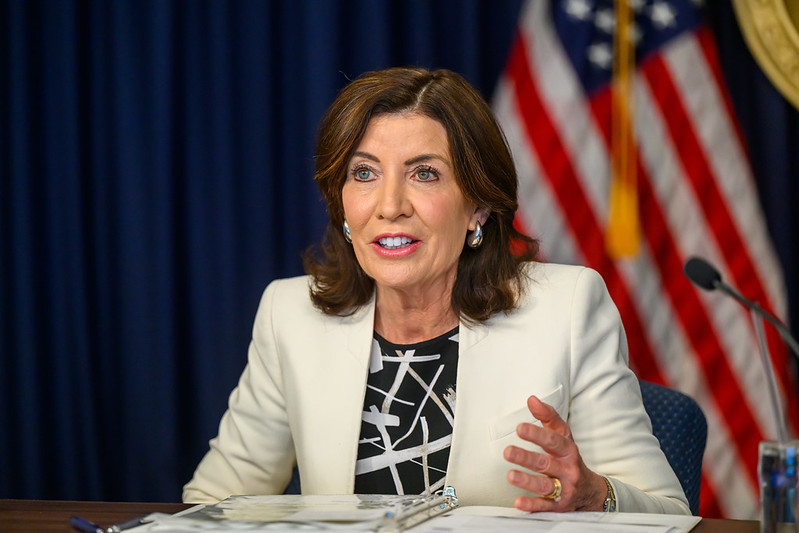By Dustin Brown
Gloria Morgenstern was not especially upset to learn late in January that the state Legislature had voted to postpone school board elections for a year.
Although the move drove a wedge in Morgenstern’s plans to launch a slate of parents as candidates for School Board 24, which covers Glendale, Ridgewood, Maspeth, Middle Village, Elmhurst and Corona, she was never excited at the thought of running for the school board.
“We were only going to do it to get rid of them,” Morgenstern said, alluding to current school board members she and other parents had intended to oust. “We didn’t really want to run on the school board. We’re happy that we don’t have to. We hope that they go away.”
The postponement of the May elections, a move expected to give the state time to reform the city’s educational system and possibly eliminate school boards entirely, is an anticlimactic first step in a process many say has been long in coming.
Former Mayor Rudolph Giuliani and now Mayor Michael Bloomberg are staunch advocates of doing away with the central Board of Education and putting control of the school system in the hands of the mayor to increase accountability.
As co-president of the Presidents’ Council for School District 24, comprised of presidents from the schools’ parent support groups, Morgenstern has locked heads with the school board for two years over its decision not to renew the contract of Superintendent Joseph Quinn.
“I personally am all for getting rid of the local school boards,” she said. “As far as I’m concerned, it’s all political.”
In western Queens, you are apt to find few true advocates for maintaining the present system, even among members of the very school boards that may be eliminated once the dust settles.
But school board members disagree on the types of reforms they seek.
“I feel we serve some modest use, but it’s not all that relevant,” said Dorothy Wilner, a former teacher who has sat for 19 years on School Board 30, which serves Astoria, Long Island City, Woodside, Sunnyside and Jackson Heights. “I think the district can function perfectly well without us.”
Wilner stands among many school board members who feel they lost much of their purpose when the state Legislature passed a 1996 law that eliminated their ability to approve the budget and appoint school administrators.
“I see no purpose of a school board right now if we’re not allowed to get involved in the budget,” said John Ciafone, an attorney from Astoria who has sat on School Board 30 for six years. “How do we effectively make policy? We really can’t make policy other than advocating issues. But the best way to advocate an issue is to vote on the budget.”
Indeed, Ciafone has faced criticism at meetings for proposing resolutions that call for basic school reforms, such as improved conditions in the bathrooms or more accurate clocks, which other board members and people in the audience contend are beyond the board’s reach.
“I’m frustrated,” Ciafone said. “I think a lot of the board members are frustrated because we’re not able to decisively effect change in the system.”
Pat Grayson, the president of School Board 24, agrees.
“What in God’s name is the sense of having us?” Grayson asked. “I feel so frustrated when I can’t accomplish anything.”
But the 1996 law change was also considered a necessary step to remove corruption from the school boards, which for a long time were known to hire administrators based on a system of cronyism.
One area where the school boards maintain some strong support is in their capacity to serve as a conduit between parents and the schools.
“We know that the school board is used to hear our local issues,” said Yvette Grissom, a parent organizer for the advocacy group Queensbridge Community in Action, members of which often attend School Board 30 meetings. “If that were abolished, then where would we go? None of that has really been fleshed out.”
Linda Sansivieri, a longtime member of School Board 24, believes the importance of the boards’ role as liaisons to parents is reason enough to keep them around. But others say the superintendent or the school leadership teams will do as good or better a job at keeping open such lines of communication.
Board members are also torn about the importance of the central Board of Education. Wilner, for instance, supports the elimination of local school boards but believes strongly that the central board is vital to the citywide system.
“I do feel that there should be responsibility for curriculum, for the education of over a million children, that should not be based totally on a mayor whose primary concern is the budget,” Wilner said.
But either way the postponed elections in no way spell certain death to school boards. The Legislature made a similar move about a decade ago but ultimately kept the boards in place.
“I thought then they were getting rid of us, but it didn’t happen,” Sansivieri said.
Reach reporter Dustin Brown by e-mail at Timesledger@aol.com or call 229-0300, Ext. 154.

































